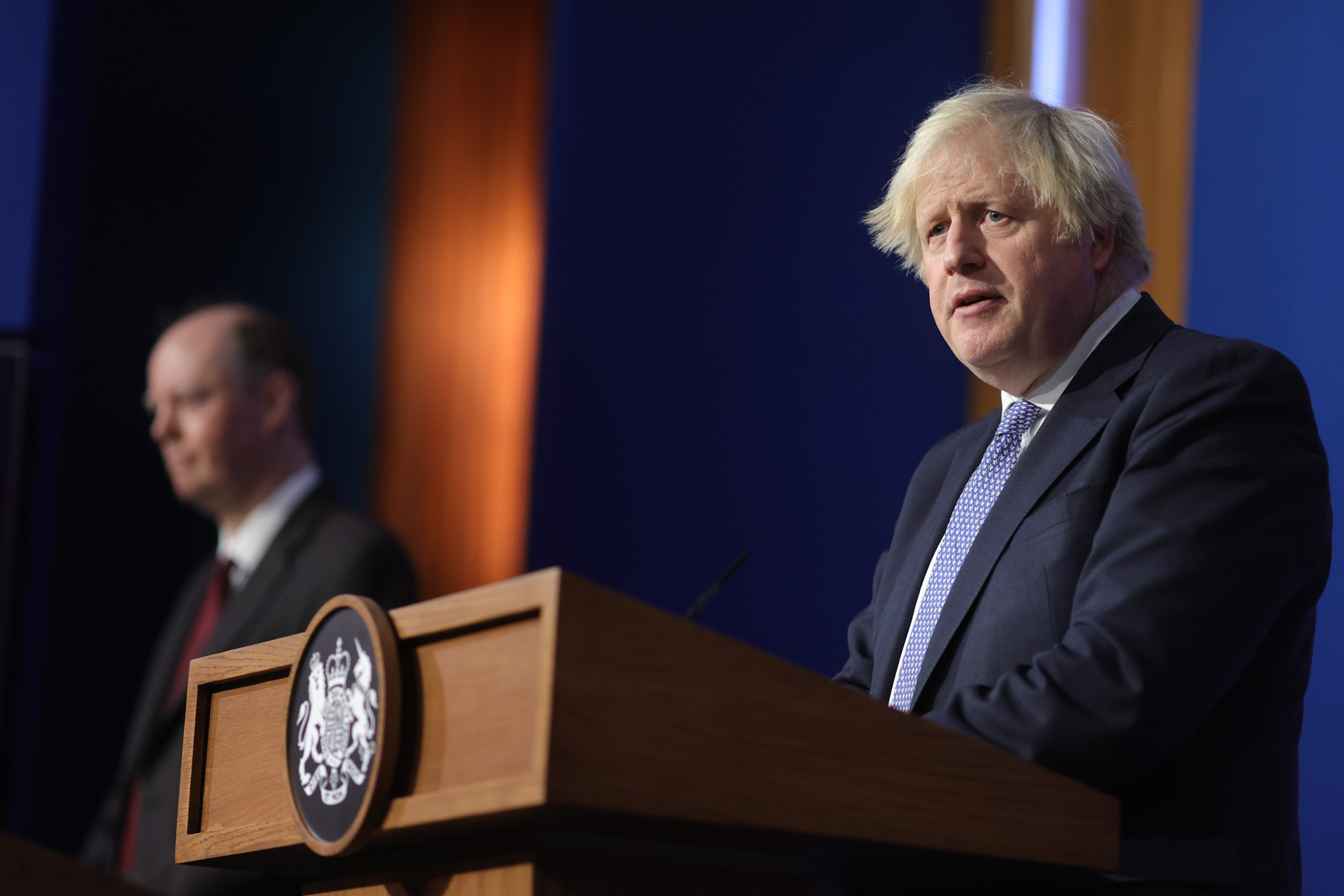
The Boris Johnson Party Is Over For The British Establishment | SC Cook
When Boris Johnson won the 2019 General election with a majority of 80, it represented a pivotal moment for the British establishment.
He had destroyed and humiliated the Corbynite left – a movement which had spooked the elite by coming inches away from winning office in 2017.
But he had done much more than that, he had seemingly solved two related crises for the British ruling class.
The first was Brexit and the other was the crisis of legitimacy facing the political and economic establishment.
Through a hardline stance, pioneered by his then advisor Dominc Cummings, Johnson purged Remainer Tories and called the EU’s bluff over No Deal, even going to war with parliament and suspending it to carry his position through.
That period of Autumn 2019, where Johnson positioned himself as the enemy of a political lineage which included every Prime Minister going back to John Major, and where Jeremy Cobyn was bullied into being a mouthpiece for a second referendum, was political goldust for the Tory leader.
It was through such an approach that Johnson was able to reinvent himself and Toryism anew.
His leadership was cast as if it was unlike what had come before and, crucially, wasn’t afraid to defy the majority of the economic elite in order to deliver on its promise of leaving the EU and its key associated bodies.
It should come as no surprise how this approach was a wild success. A majority of people had voted to leave the EU in the biggest vote in British political history. But instead of accepting that, a group of people associated with the most despised scandals of British politics, from sleaze to Iraq and austerity, sought to overturn it.
It’s hardly surprising that people thought this was unacceptable, and was a disaster that a significant section of the Corbynite left went along with it.
So when Johnson won the election so convincingly, he solved the immediate crisis of Brexit, delivering a majority so big it vanquished the notion of a second referendum and sent a clear message to the EU that a deal had to be made that couldn’t all be on their terms.
In doing this, Johnson also built up a level of political credibility that most politicians can only dream of. By being the figure most associated with actually delivering the result of such a huge popular vote, against the majority of MPs, Johnson himself became Tory leader with a level of popularity many thought impossible to achieve in the modern era.
And the goodwill he received, which related to deeply political issues around democracy, power and representation, seemingly was able to override the reality of who he was: a fighter for his class – the ruling class – who was just as nasty, racist and committed to British capitalism as those that came before him.
The difference was, of course, that Johnson had delivered something tangible, and because of this, and the weakness of his discredited opponents, had arrested the crisis of legitimacy facing the British ruling class.
With Johnson at the helm, and the upheavals of 2015 – 19 relatively settled, the Tories and the class they represent could think of a decade in power with a degree of confidence.
It’s impossible to assess what the true impact of the past week on British politics will be, but we can say with some certainty that this confidence has been shattered by the Christmas Party scandal.
What now faces the establishment is not a period of stability, where it can carry on with a certain level of predictability, but yet more upheaval.
The Tories were able to ride high in opinion polls throughout a pandemic where their mishandling and open negligence cost thousands of lives because of the high levels of political credibility Johnson had accrued in 2019. This is now crumbling.
A Savanta ComRes snap poll on Wednesday showed over half of all voters (54%) said Boris Johnson should resign over the scandal. Out of just Conservative voters, 33% thought he should quit.
An Opinium poll for the Observer on Sunday found that 57% of voters think Johnson should now resign, with the Tories down on 32%, their lowest for over 2 years, and Labour 9 points ahead on 41%
According to the political correspondent for the Financial Times, Jim Pickard, the bookies now favour the Liberal Democrats to win the North Shropshire by-election, where the Tories have a majority of nearly 23,000.
This was before fresh images were released by the Daily Mirror on Sunday of Boris Johnson at a Chritsmas quiz.
This crises facing Johnson is important and must be recognised, because we see what political stability for the British ruling class looks like for the rest of us: a further authoritarian shift through the Police and Crime Bill and a racist crackdown on asylum seekers in new immigration laws, among other things. Any disruption of this has to be welcomed.
Of course, the crisis now facing the Tories is not isolated, but comes on the back of a series of scandals, from Dominic Cummings to Lex Greensill, Owen Patterson, the Downing St Flat, PPE contracts and so on.
Some of these have been more damaging than others, but each has chipped away at the Johnson fortress that emerged after the 2019 election. The latest scandal is the most serious yet, and it’s hardly surprising that its found resonance.
Lockdowns are a mass event, affecting everyone with a similar experience, albeit in different ways depending on your financial status, size of house, living circumstances, access to a car and so on.
Still, the experience of both the act of lockdown itself – being isolated – and the reason the vast majority make the sacrifice – to save lives – is a common lived reality.
The Christmas party, and the scene of senior aides laughing about it, strikes at the heart of this mass experience, and lights a torch paper underneath all the pain and anger that’s accumulated over the past 18 months over a whole series of issues, coming as it does in a way that only reminds people of the Barnard castle incident.
Like that scandal, the Christmas party makes a total mockery of Johnson’s strategy of being an anti-politician. These crises instead show his leadership to be just as dishonest and contemptuous of ordinary people as those who have gone before him.
Far from being separate from the rot, he is the rot. Many will point out that this has always been the case, but whilst that’s true, in the past he’s been able to manoeuvre out of these situations. Not this time, and it isn’t just the left saying this, in fact many on the right, who previously hailed Johnson as their saviour, are now turning on him.
The veteran right wing broadcaster Andrew Neil wrote on Wednesday that while it “will not happen overnight or even in the next few months… we have entered the beginning of the end of Boris Johnson.”
Writers in both the Spectator and the Telegraph are also saying that the party is over for Johnson this week.
In this situation, people are rightly asking ‘but then what?’ If Johnson is replaced by another Tory then aren’t we just back at square one?
The beginning of the answer to this question is to say no one can really replace Johnson.
Not because he personally is irreplaceable, but because no other Tory will be able to go through a period akin to Autumn 2019 and create their own origin myth as powerful as what Johnson had.
It’s therefore highly unlikely other senior Tory will be able to win the same degree of popular support and develop a right wing electoral base.
Johnson’s success at the ballot box has largely kept factionalism on the Conservative benches at bay at a time when many have been furious about Covid restrictions. If that goes, either through a continual slump in the polls or another leader, then unity is harder to maintain.
And if another leader does come in on the back of these multiple crises, they will be weaker than Johnson has been at any point over the past 2 years and themselves be associated with the current fiasco.
A similar scenario faces Keir Starmer if he becomes Prime Minister as a result of this. A figure who has pledged to be a leader for the ruling class first and foremost, Starmer would nevertheless be entering Downing St on a wave of anti establishment anger and be highly vulnerable to external pressure.
Of course, no one should be under any illusion that the Tories, or indeed Johnson, are going anywhere fast. They still enjoy a sizable majority and Labour are a poor opposition. There is possibly three years until the next election and in that time the Tories will try to put the Christmas party into the past.
But the honeymoon period is well and truly over, and we are now in a different phase than the one that we’ve been living in from the 2019 election onwards. This has come sooner than many predicted.
And if we add in the potential of a rise in strike action, an ongoing crisis in public services and the constitutional battles in Scotland, Wales and Northern Ireland as well as negotiations with the EU, it shows why the government requires stability to ride it out.
The situation we now find ourselves in, with a sudden rise in disillusionment with the government, coupled with a parliamentary situation where the Tories have a big majority and Corbynism defeated, is one that favours extra-parliamentary struggle.
This is especially the case given the promising signs of worker militancy we are currently witnessing.
It’s interesting that this crisis comes on the two year anniversary of the 2019 election, as if to emphasise that the situation for the left is completely different, where something like the Yellow Vests in France looks more likely than a new electoral vehicle.
Like the Yellow Vests, it’s likely that any movement that emerges from the current crisis is likely to be politically fluid, encompassing elements from anti-lockdown sentiments to Kill the Bill and everything in between.
This is why some of the arguments that have decried the furore over the Downing St party as either a dead cat or an issue that doesn’t deserve as much attention are misplaced.
We live in a world of uneven political consciousness, where people’s thoughts have been moulded by the ruling ideology. We can’t simply make people animated about something through sheer will power or strength of our arguments, even if it is objectively more important than the Downing St party.
This does not mean for a second that we should stop trying to build opposition to or mobilise against things like the Police and Crime Bill or the Nationality and Borders Bill.
What it does mean, however, is welcoming the breakdown of Johnson’s political legitimacy and the growing levels of discontent over ‘one rule for them’ – and trying to link this to other issues.
The important thing is to not dismiss the potential of the shift in mood against the Tories and think only in terms of parliamentary majorities and general election dates. There is a danger both in overestimating the problems faced by the Tories and of underestimating them.
But the right recognise they are in a new period now and the political terrain has shifted against them. We must not sit back and let them figure out an easy escape route.
Cover image via No 10 on Flickr (CC BY-NC-ND 2.0)


